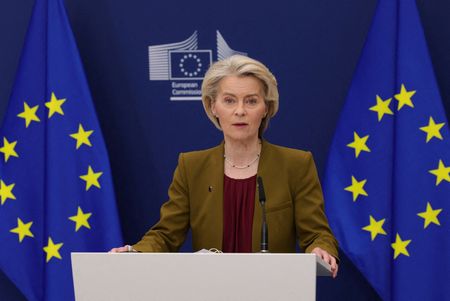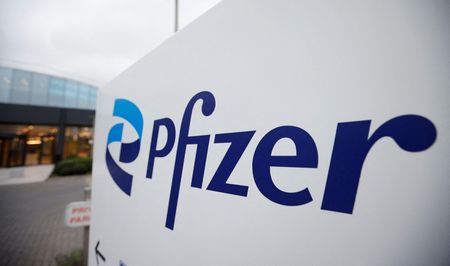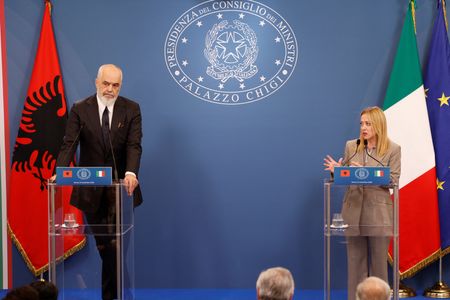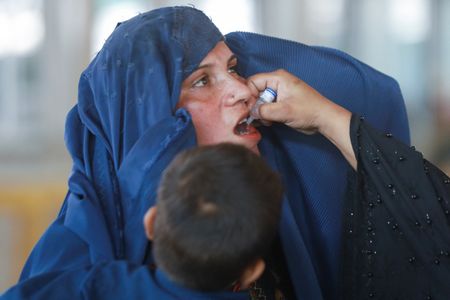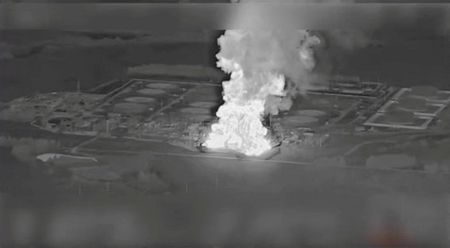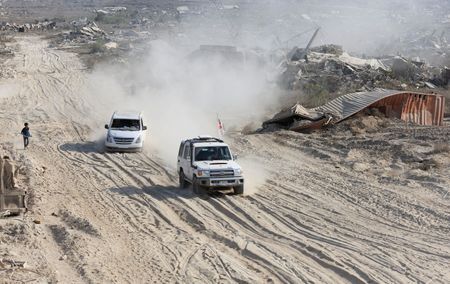By Bart H. Meijer and Lili Bayer
BRUSSELS (Reuters) -Funding Ukraine with a reparations loan based on immobilised Russian assets would be the most “effective” of three options being considered by the European Union to help Kyiv, the head of the bloc’s executive Commission said on Thursday.
Ursula von der Leyen was speaking to the European Parliament as EU finance ministers met to discuss how to honour their pledge to help cover Ukraine’s financing needs in 2026 and 2027.
Von der Leyen said the other options envisaged the EU borrowing money from the market using its long-term budget as collateral or EU governments borrowing the cash themselves to lend or give to Ukraine.
But the reparations loan option, drawing on the frozen Russian assets, is “the most effective way to sustain Ukraine’s defence and its economy”, she said.
“We give a loan to Ukraine – that Ukraine pays back if Russia pays reparations,” she told the lawmakers.
OPTION IS BROADLY SUPPORTED BY MEMBER STATES
EU finance ministers also largely favour this option as it would not increase their own countries’ debt and yet would provide Ukraine with up to 140 billion euros ($163.3 billion) over two years, covering Kyiv’s estimated needs.
Most of the Russian assets frozen in Europe are on the accounts of Belgian securities depository Euroclear. Since Moscow’s invasion of Ukraine in February 2022, almost all of the securities have matured and become cash.
The frozen assets option would involve the EU replacing the Russian cash on Euroclear accounts with zero-coupon AAA bonds issued by the European Commission.
The cash would then go to Kyiv, which would only repay the loan if it gets war reparations from Russia, effectively making the loan a grant. The option is called the Reparations Loan, because it would be linked to Russia paying reparations.
Finnish Finance Minister Riikka Purra welcomed this proposal, saying: “It is the only option that has both sufficient firepower and limits the strain on our national budgets.”
But Belgium, which is home to Euroclear, believes it could be liable in the event of a successful Russian lawsuit against the company and wants EU governments to pledge they would come up with the necessary cash to repay Moscow within three days if a court ever decided that the assets must be returned.
The Kremlin has said the proposal would represent an illegal seizure of Russian property and has said it would retaliate, without elaborating.
Belgium therefore also wants the Commission to produce a solid legal base for the whole operation to minimise the risk of a lost lawsuit and has asked other EU countries that hold frozen Russian assets to join the scheme to spread responsibility.
The Commission is now in talks with Belgium to address its demands with a view to securing support of EU leaders for the plan in December.
($1 = 0.8575 euros)
(Reporting by Bart Meijer and Lili BayerEditing by Gareth Jones)

